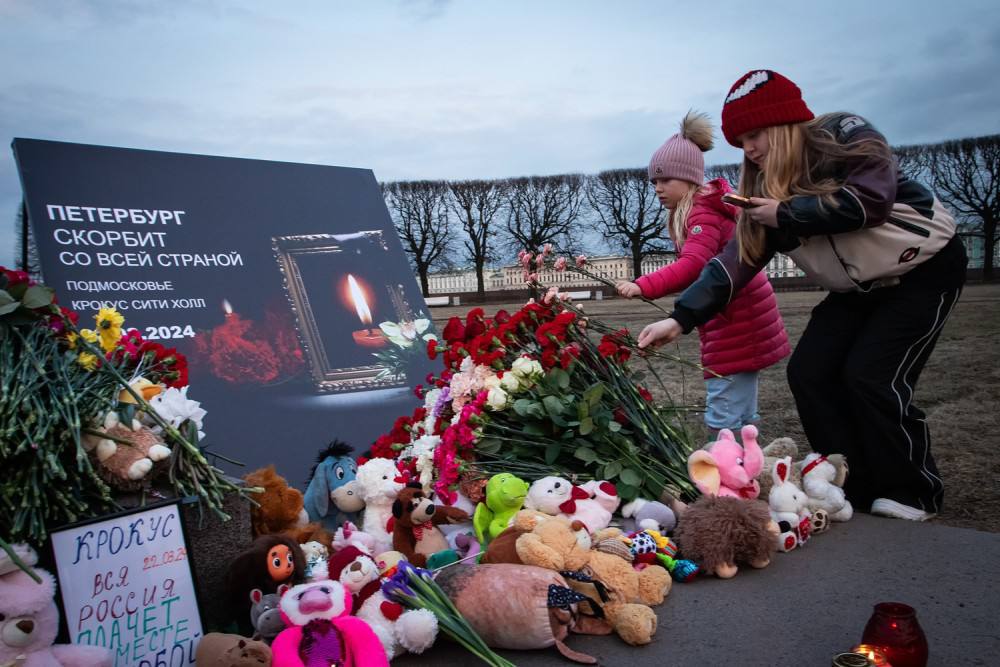Shabi Khoun to Putin in the heart of Moscow
Attack on Moscow, Kremlin’s Reality
Shabi Khoun to Putin in the heart of Moscow, after the attack on Crocus City Hall, President Vladimir Putin disregarded the Islamic State’s claim and pointed the finger of accusation towards Ukraine. Russia, saddened and shocked, mourns the 137 victims and 180 wounded in the Friday night attack on Crocus City Hall on the outskirts of Moscow, a tragedy that was the worst terrorist attack in this country in over a decade. Immediately after this incident, a court in the capital issued arrest warrants for four men accused of this massacre.
Meanwhile, a branch of the Islamic State known as ISIS-Khorasan, through the Amaq news agency, claimed responsibility for the attack and released images and videos of it. However, despite the existence of abundant evidence against this group, which has also been confirmed by Western intelligence services, it seems that the Kremlin is focusing its attention on unfounded responsibilities of Ukraine, which raises concerns that Moscow wants to attribute the whole operation to Kiev to justify escalating current conflicts and push the Russians towards a new campaign for compulsory military service.
In addition to the concern reported today by several observers, the fact is that in Vladimir Putin’s speech to the nation, which came hours after the attack, the President of Russia not only did not mention ISIS but also raised the hypothesis of collusion with Kiev in a plot to help terrorists, a project thwarted by Russian authorities.
The attackers, who were detained and identified as Tajik citizens, requested a translator as they did not speak Russian. They were arrested in the Bryansk region on the border with Ukraine. They all confessed, and when they appeared in court, signs of violence and severe beatings on their bodies were clearly visible.
Unanimous condemnation
Peter Stano, the spokesperson for EU foreign policy, wrote on social media that almost all countries internationally have unanimously condemned the attack on unarmed civilians. He added that the EU is shocked and appalled. We express solidarity with all Russian citizens affected by this incident, and the US State Department also emphasized condolences and solidarity.
Currently, there is no evidence of Ukrainian involvement in this terrorist act, and the United States has never encouraged Ukraine to strike Russia from within and endanger the lives of civilians. The images of the horrific attack on innocent people in the Krokus city hall were very shocking.
Annalena Baerbock, the German Foreign Minister, also wrote on X network, expressing our deepest condolences to the families of the victims and the wounded. From Paris, her French counterpart, Stephane Sejourné, deeply expressed solidarity with the Russian people and the bereaved families. Yulia Navalnaya, the widow of the late Kremlin critic Alexei Navalny, wrote on her social media profile that all those involved in this crime must be found and prosecuted, and finally offered condolences to the families of the affected and the victims, and wished for the recovery of the injured.
A credible claim
Despite Moscow’s claims, intelligence services consider ISIS claims credible, as political analysts noted. This attack, which occurred just over two weeks after a warning issued by the US Embassy in the Russian capital, was said to be planned by extremist groups to target large gatherings, including concerts.
However, the Kremlin described this warning as provocation and blackmail aimed at destabilizing society. Perhaps today, the Kremlin’s efforts to blame the attack on Ukraine are a way for Russian authorities to escape being accused of ignoring or downplaying the same warning.
The Kremlin leader said a door had been opened for terrorists to enter Ukraine, but Russian security forces’ intervention prevented the escape plan from being executed. Certainly, those responsible will be punished. Putin’s success in last week’s Russian elections seems to have ushered Russia into a new phase. The term ‘war’ has taken the place of special operations in Kremlin circles, and the media is once again discussing the mobilization of military forces and soldiers.
A suitable enemy
The fact that Moscow is trying to promote its version of the incident after the attack is completely in line with the tradition that we have seen Putin use repeatedly, meaning he has often used major tragedies that occurred during his presidency as tools to intensify crackdowns and strengthen his power.
This incident dates back to 1999 with bombings attributed to insurgents from Dagestan and Chechnya that leveled two buildings in Moscow, killing 293 people. Later in 2002, the hostage-taking at the Dubrovka Theater in the capital, which ended with over 130 victims, and again in 2004 with the massacre at School Number One in Beslan, North Ossetia, where after a three-day siege, the intervention of special forces resulted in the death of over 300 hostages.
Today, given the Russia-Ukraine war, Moscow’s innuendos are not surprising, but they lack essence and logic. If it is true that Kyiv has been targeting military and industrial objectives, airbases, and ports in these two years, and perhaps even flying drones over the Kremlin.
But the leaders know well that by committing a massacre of civilians inside a concert hall, they will lose all their international support. Ukrainian Foreign Minister Dmytro Kuleba on Monday called Putin a pathological liar who is desperately trying to link Ukraine to the shooting incident despite having no evidence to support his claim.
It seems that the scale of the attack Russia has faced is taking us back to the darkest era of terrorism, reminiscent of the Chechen war from the mid-1990s to the early 2000s. However, the political conditions both internally and externally in Russia today are vastly different. In the early 2000s, Putin solidified his popularity by harshly suppressing terrorism in the North Caucasus. While threats still exist there today, they are generally under control. Considering that these threats come from Central Asia and Afghanistan and due to their less defined and broader nature, combating them is much more complex nowadays.
In addition, Russia is a country at war and must face all that comes after a war, from focusing attention and resources on Ukraine to the worsening of relations with the United States, which has been Russia’s partner in fighting terrorism in recent years. Therefore, it is not surprising that Putin is responsible for this attack in the Kremlin.
Ukraine is a more identifiable and accessible enemy. Also, in Russia, which is now openly referred to as a country at war even by Putin’s spokesperson, this could provide a stronger motivation for a new wave of compulsory military service and lowering the conscription age, which rumors have recently been circulating about in Russia.


